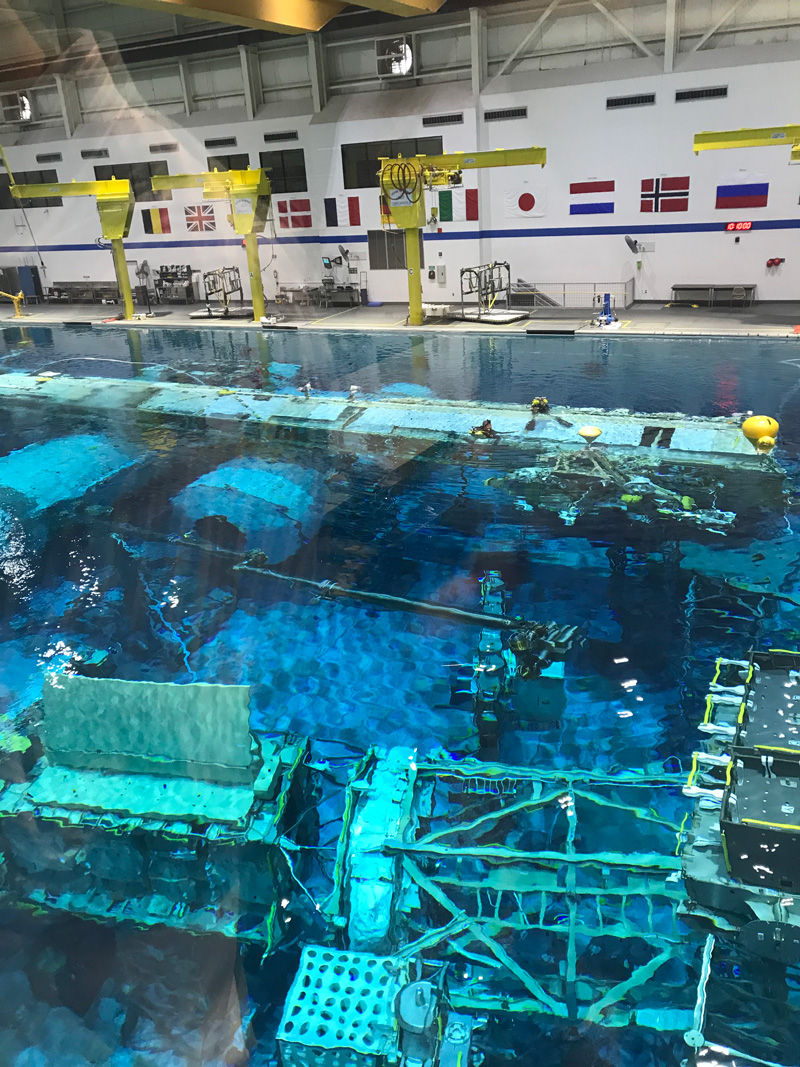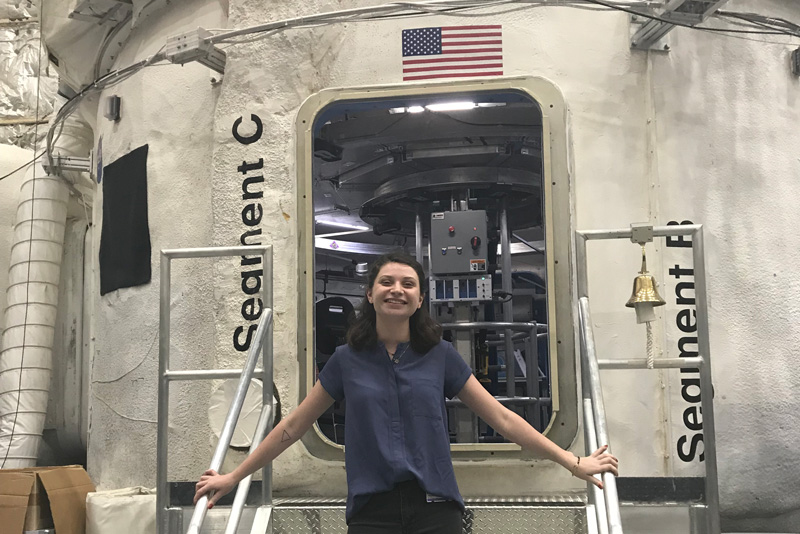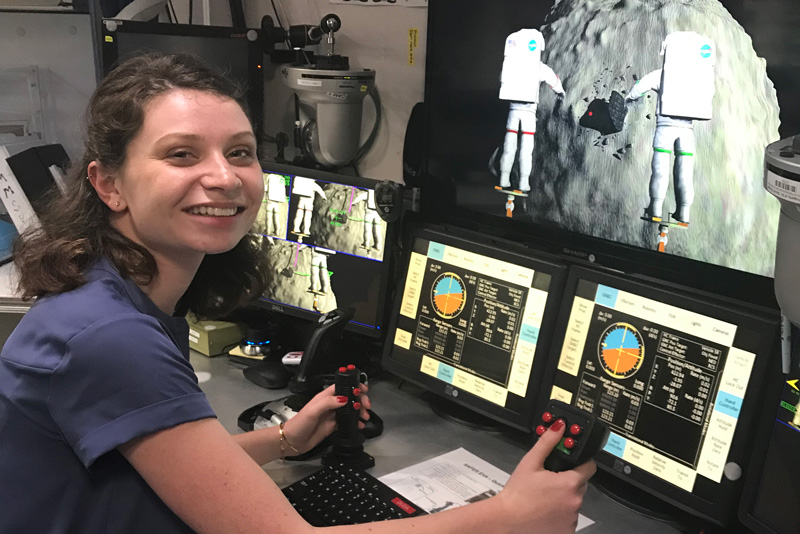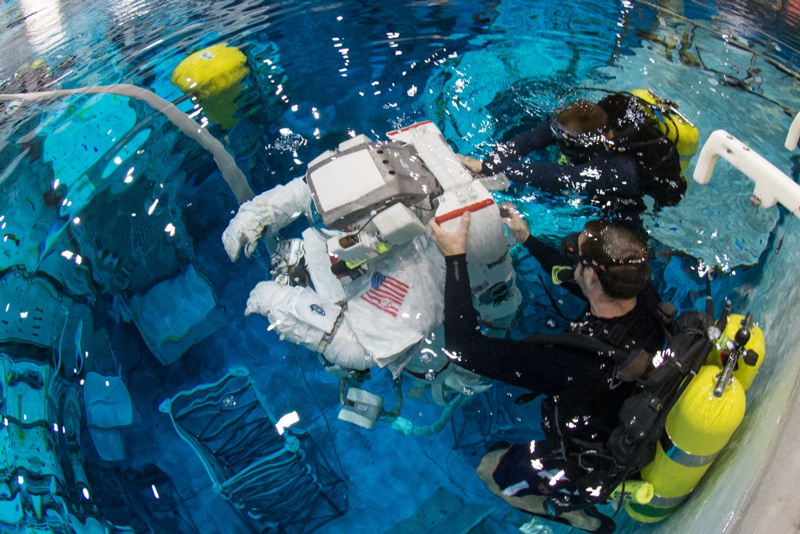

Soaking up knowledge during NASA internship
Photos courtesy of Natalie Zimmerman and NASA August 03, 2018
UD student Natalie Zimmerman learning at Johnson Space Center
Editor’s note: Natalie Zimmerman, who will be a junior this fall in the University of Delaware’s College of Earth, Ocean, and Environment, has an internship this summer at NASA’s Johnson Space Center in Houston. Zimmerman, who is from Scotch Plains, N.J., is an Honors geology major, with minors in computer science and chemistry. Her internship is supported by the UD-based Delaware Space Grant Consortium, which is part of a national program funded by NASA to train students and researchers in areas of science, technology, engineering, mathematics, and geography. This is the second of three planned UDaily stories in which Zimmerman will share her summer internship experiences.
“Be a sponge.” This was advice that I received one day recently, during a speed mentoring event setup by an employee resource group at NASA’s Johnson Space Center called WELL (Women Excelling in Life and Leadership).
I only had 8 minutes of mentoring with the full-time aerospace engineering employee before I had to switch, and she had just told me to be a sponge. I’m not going to lie, that was a little different from the “follow your dreams!” or “study hard!” advice that I was expecting.

After she explained, it became a bit more clear — she told me to soak up as much information in as many forms as possible. Read as much as I can, take every and any course that interests me, and reach out to professionals doing work that intrigues me. Knowledge, she told me, is something that you can never have too much of, and constantly researching and learning will provide you with inspiration to set your goals and a way to achieve them. This is some of the most useful advice that I’ve ever received, and something that I fully intend to take to heart.
JSC is a great place to practice this — there are so many projects in so many disciplines and fields of work, that it is hard to have a conversation with somebody without learning something new.
It can be hard to get my work done at points, sitting in my cubicle, knowing that a few buildings away an astronaut is receiving training or Mission Control is conversing with the International Space Station (ISS). I try to take advantage of every tour or lecture opportunity that is offered to me, and as a result I’ve seen some pretty amazing things and met some pretty amazing people.
The other day I was able to tour the Neutral Buoyancy Laboratory, a 40-foot deep, 6.2 million gallon pool with a 1:1 mockup of the International Space Station. Astronauts get into real space suites to dive in it, and are assisted by scuba divers to train for space walks on the ISS. I was given a unique glimpse into not only astronaut training, but the work of the scuba divers that help train them. I left the NBL fascinated and motivated, and wanting to see more.
Another amazing place I’ve had the privilege to tour is the Human Exploration Research Analog. HERA is a spacecraft mockup, where groups of four people spend up to 45 days in isolation. They simulate a real deep space mission, interact only with mission control, and are studied to see how they respond mentally and physically. As a geologist, I don’t have much previous knowledge in psychology, but I found myself fascinated when I toured. I probably annoyed the project leaders with how many questions I asked them, but learning about HERA made me curious to know more.
I am very eager to make the most of my time this summer, and learn as much as I can. As much as I love the cool space projects here, I’m even more excited to learn about the people. JSC is home to some truly extraordinary employees, with amazing stories and a wealth of advice they are happy to share.
Sitting in on a lecture by Ginger Kerrick honestly changed my life. (Ginger is the first non-astronaut CapCom, short for Capsule Communicator, the person who relays messages from Mission Control to astronauts in space. She’s awesome, look her up.) She knew at the age of five that she wanted to be an astronaut, and pursued that despite facing a lot of adversity throughout her life. When she submitted the astronaut application, she got extremely close to being accepted. She was denied the position because she had kidney stones — if you have ever had kidney stones you can’t go to space. Rather than give up, she continued to have an extremely successful career, full of being a trailblazer and having one-of-a-kind experiences. One thing that she kept repeating is that “you won’t know if you don’t ask.”
A lot of times, people just assume that they can’t do something — for a long time, I assumed that I would never work at NASA. If you never ask or never try, though, then it definitely won’t happen. To phrase it in the most cliched way possible, you miss 100% of the shots you don’t take. Ginger, for example, once asked the JSC medical staff if she could use the NASA ambulance and gurney to transport a five-foot long cake to an astronaut’s birthday party, and they said yes! Imagine if she hadn’t asked — that poor astronaut would have never gotten his space- themed cake.
Beyond random space facts and and career advice, I’ve also learned a lot about sustainability — information that I hope I can bring back to UD and continue to apply to the rest of my education and career. I was already passionate about geology and sustainability going into this internship, but that passion has grown this summer. I’m ready to throw myself into my classes this fall, and I can honestly say that I’ve never been more excited to study in my life. Interning at JSC has shown me the power in knowledge: how it can inspire and guide you, and how it can help you accomplish your goals. So far, this has been a summer of learning for me, and I’ve loved every minute of it.
Previous story: UD student begins internship at NASA’s Johnson Space Center
Delaware Space Grant Consortium
The Delaware Space Grant Consortium (DESGC) is funded by NASA in order to train students and researchers in the state of Delaware in the areas of science, technology, engineering, and mathematics. The DESGC is led by the University of Delaware and represents all higher education institutions within the jurisdiction. It supports graduate fellowships, undergraduate tuition scholarships, and summer internships within Delaware and at NASA Centers. For more about DESGC see www.delspace.org.
Contact Us
Have a UDaily story idea?
Contact us at ocm@udel.edu
Members of the press
Contact us at 302-831-NEWS or visit the Media Relations website




